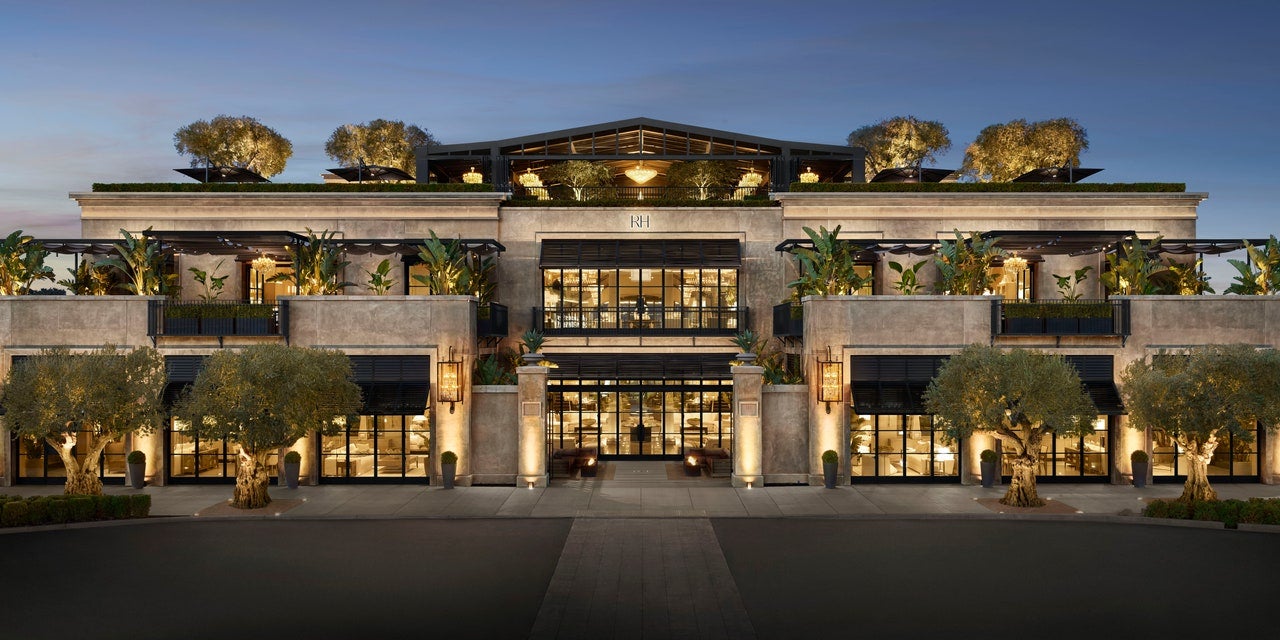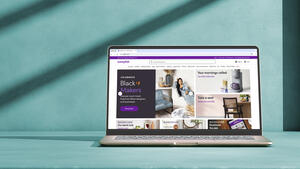RH had a successful year—and they’re taking it to the bank. In 2020, the company’s net revenue was $2.85 billion, up 8 percent from $2.64 billion in 2019. In the fiscal fourth quarter alone, RH saw a 36 percent increase in demand for its core collection and a 22 percent increase in revenue, from $665 million to $812.6 million.
“It’s about what we thought we were going to earn before the pandemic,” RH chairman and CEO Gary Friedman said last week on the company’s Q4 earnings call. The icing on the cake? He says RH now has an operating margin more than 50 percent higher than that of its closest competitor in the home furnishings market. Wall Street was equally positive about the company’s position, and shares of RH jumped 9 percent to an all-time high immediately following the news.
Friedman has long had his sights set beyond the home furnishings category, and has begun to compare his company to luxury fashion and lifestyle brands like Chanel or LVMH in recent years. On last week’s call, he was able to report that RH had bested many of them: “Since our IPO on November 2, 2012, at $24 per share, RH has outperformed Apple, Amazon, Google, Facebook, Nike, Starbucks, LVMH, Home Depot, Hermès and just about everyone else but Tesla,” he said.
In a letter to shareholders that accompanied the earnings report, RH noted that due to the supply chain disruptions caused by COVID-19, “approximately $150 million of demand that was generated in 2020 will be recognized as revenue in 2021, while the majority of the selling costs to generate that demand was absorbed in 2020.” This is good news for shareholders who, on the heels of a successful 2020, can expect more positive numbers this year.
Despite the industry-wide pivot to e-commerce, Friedman indicated that RH has no plans to close any brick-and-mortar stores, and plans to continue creating physical storefronts, restaurants, and more in the coming years. The brand already has 68 RH Galleries and 38 outlet stores across the U.S., and has plans to expand internationally by 2022, with RH England and RH Paris storefronts. It is also slated to move into the hospitality sector with the opening of its first RH Guesthouse in New York this fall. (A Guesthouse in Aspen is set to open in the fall 2022.)
Which isn’t to say the brand won’t be growing online. This fall, it is slated to unveil The World of RH, an online portal with new content showcasing product, services and more.
If that isn’t enough on the horizon, Friedman alluded on the call to the forthcoming RH Residences—uber-high-end RH-designed and -furnished homes—that are set to be built in Aspen. In addition to planting another flag in a key luxury market, the homes are another clear effort to cement RH as a lifestyle brand, not just a furniture one. Though there is neither a timeline for construction nor renderings, Friedman noted that the project had already garnered substantial interest, with buyers offering to buy the properties sight unseen.
“We put out a single-page press release about Aspen, and I don’t think I’ve [ever] had more billionaires reach out to me and send me notes,” said Friedman. “I personally had three requests to buy one of the homes—my partner had 12 requests.”
While the home industry has unquestionably benefited from a 2020 largely spent at home, Friedman insisted that he isn’t concerned about the bubble bursting post-pandemic. “There’s nothing about our revenues that are pandemic-assisted,” he said, noting that February 2020’s business was up 73 percent and the first two weeks of March were up 96 percent before the company shuttered its Galleries, restaurants and outlets. He cited the company’s lack of a cash-and-carry business (what he called “basically floor-model sell-off”) as the cause of any revenue lag relative to its competitors. He also noted the pandemic didn’t change anything about RH’s real estate or online strategies, but added, “It would be very hard to build a model like ours if you’re playing in the middle of the market.”
A breakdown of the RH shopper proved illuminating, and suggested that the company’s clientele isn’t going anywhere: Friedman noted that 80 percent of RH’s pre-pandemic business was already for suburban homes, with only 10 percent urban homes and 10 percent second homes. Since the onset of COVID-19, its suburban home market has remained the same; second-home shoppers are now 12 percent of the pie, and urban buyers make up 8 percent. In short, RH’s city-dwelling buyers are a small fraction of its overall consumer base, so the company isn’t worried much about that subsection possibly declining. “Our business is architected perfectly for whatever long-term change this pandemic has,” said Friedman.
Homepage photo: RH Marin, a 60,000-square-foot outpost near the company’s headquarters, opened amid the pandemic in the summer of 2020. | Courtesy of RH





























